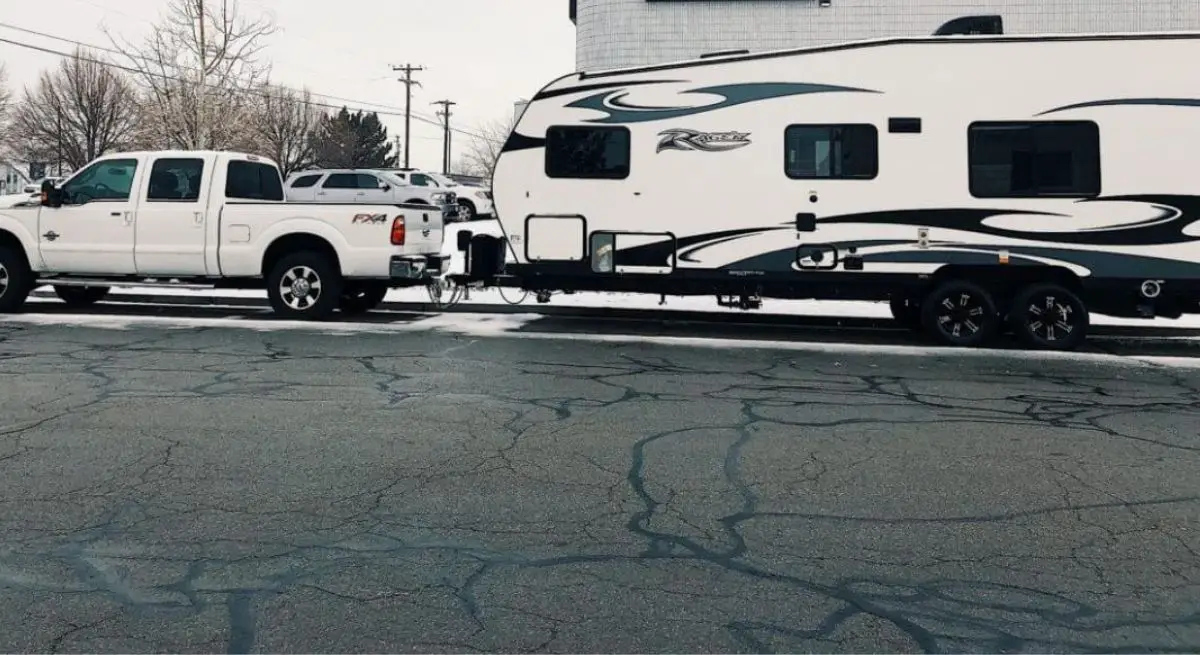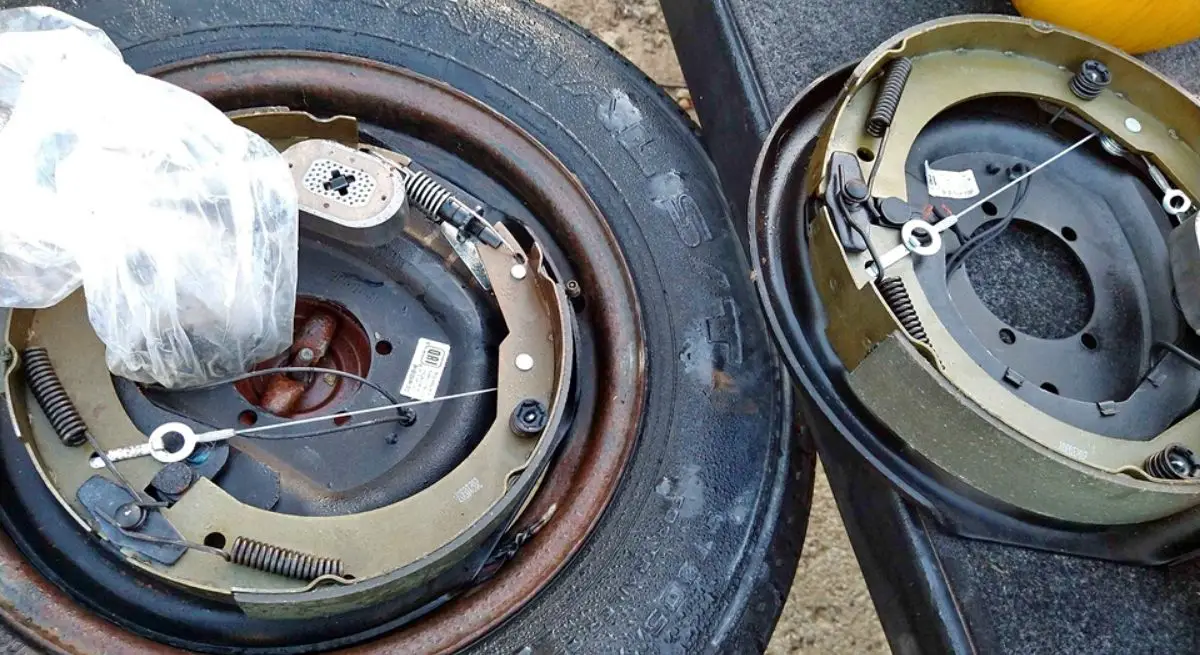The maximum amount of weight you can tow without brakes on your trailer will depend entirely on the state in which you are traveling. Laws governing trailer brake requirements are based on trailer weight and are set on a state-by-state basis. If your trailer is not equipped with trailer brakes it is always a good idea to research the requirements for each state that you’ll be traveling through before you depart.
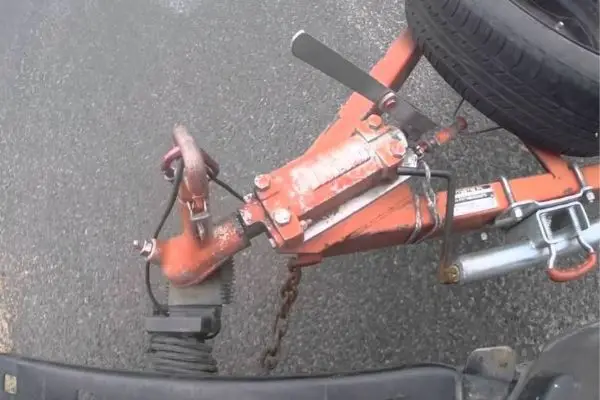
Are There Different Laws With Trailer Brakes For Each State?
Trailer brake requirements are set at the state level and they vary significantly from state to state. Some states have no requirements, Massachusetts requires them only on trailers over 10,000 lbs and other states require them on all trailers. The majority of states require brakes of some sort on trailers above 3,000 lbs. The RVIA publishes a table detailing the state-by-state requirements here.
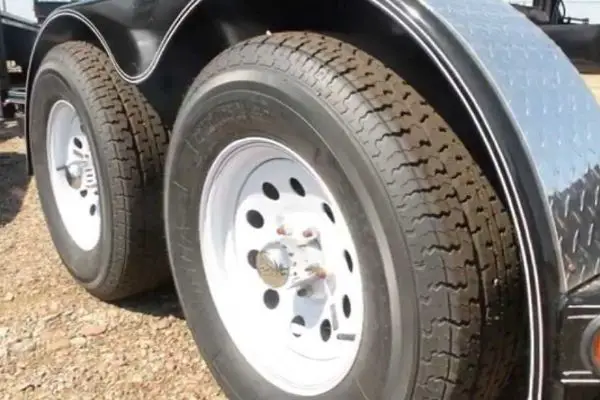
Is There A Maximum Size Where A Trailer Needs Brakes?
The only factor which goes into trailer brake requirements is weight. Length, width, and height don’t play a role in determining if you need to have trailer brakes installed on your trailer. There is a correlation between length and weight, longer trailers tend to be heavier, but length as an independent factor length is not a consideration.
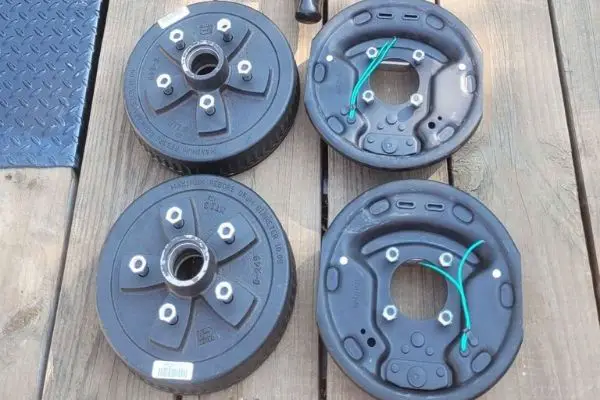
The ability to safely stop, or control the speed of a vehicle is directly related to weight. There are several basic laws of physics at play here including Force = Mass * Accelerations, for every action there is an equal and opposite reaction, objects in motion tend to stay in motion, the law of conservation of energy, and others. These laws basically tell us that the force necessary to control the speed of an object is directly related to its mass and not its physical size.
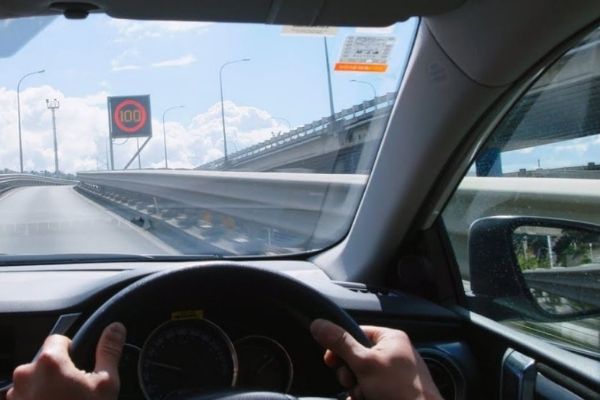
How Do Trailer Brakes Work?
There are three main types of trailer brakes in common use today. They each work a little differently, but they all apply the brakes to slow the trailer down. Here’s how they work:
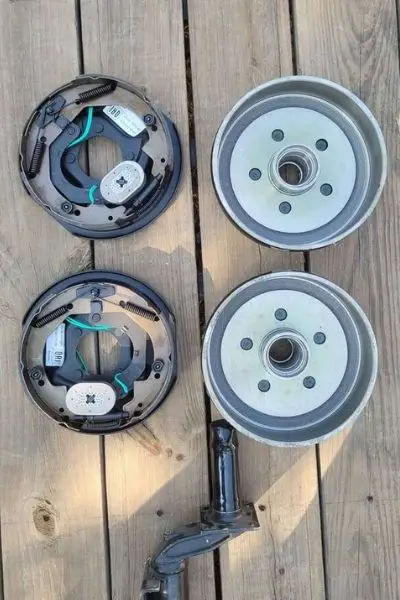
- Surge Brakes. Surge brakes are the simplest trailer breaking mechanism in use today. They are called surge brakes because they are activated by the mass of the trailer surging forward when the tow vehicle’s brakes are applied. They differ from the other two types of brakes we will be looking at in a few key ways.
a. They are completely mechanical
b. The do not require electricity.
c. They do not require any special controllers
d. They are not tied directly to the tow vehicle, it’s electrical or braking system
The key to surge brakes is specially designed telescoping trailer tongue which connects the trailer to the tow vehicle. This telescoping trailer tongue allows the trail itself to move relative to the back of tow vehicle. Under braking, the trailer will move forward. A hydraulic piston connects the two sections of the tongue together. When the trailer moves forward under braking, that piston is compressed and hydraulic fluid is sent to the brakes, increasing braking at the trailer wheels. When the tow vehicle stops braking, the trailer is forced backward by return springs on the tongue and the braking pressure is reduced.
Surge brakes offer a rudimentary braking system which is suitable for lighter trailers or tow vehicles that lack the internal support for an electric brake controller. - Electric-over-hydraulic brakes. This braking system is similar to surge brakes in that it uses hydraulic pressure to actuate the braking mechanism. However, it does this by replacing the surge brake telescoping tongue/hydraulic piston setup with an electrically driven actuator connected to an electric brake controller in the tow vehicle. This allows a standard solid tongue to be used on the trailer. The brake controller is tied intro the electrical system of the tow vehicle so it can sense when the brake pedal is depressed. It can also draw the power it needs to actually run the brakes. With this system, the driver depressed the brake pedal and the brake controller sends power to the hydraulic brake actuator. The actuator uses the power to pressurize the hydraulic lines, actuating the brakes. These systems are typically disc brake systems.
- Standard electric brakes. These are the most common brakes on trailers. They are similar to electric-over hydraulic brakes, utilizing an electric brake controller which is tied to the tow vehicles electrical system. In fact, there are a number of brake controllers which can operate both types of braking systems. The brakes themselves are very different than those in an electric-over-hydraulic system. Instead of disc brakes, you will find specialized drum brakes with these systems. In general, they look and function nearly identically to standard drum brakes found on cars. The difference is in how they are actuated. The actuation mechanism includes a powerful electromagnet coated in a special friction material which is attached to the pad actuation mechanism. When the brake controller senses the brake pedal has been pressed, it sends power to the brakes. That power activates the electromagnet, which sticks to the inside face of the drum. As the drum rotates, it pulls on the magnet which in turn pulls on the pad actuation mechanism and forces the pads against the drum. The more power the controller sends, the harder the magnet sticks. The greater magnetic force increases the friction on the magnet which increases the pressure at the pads. That increased pressure increases breaking power.
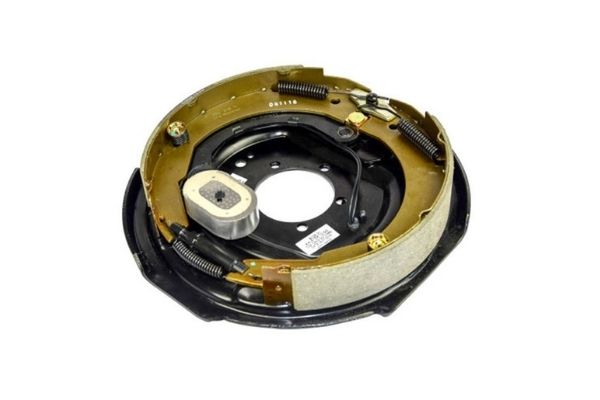
Are Trailer Break Away Systems Required?
Break-away systems are required in some states and are absent from statutes in other states. While some states require there to be a hold time of 15 min on the release of the trailer. The details for each state can be found here.
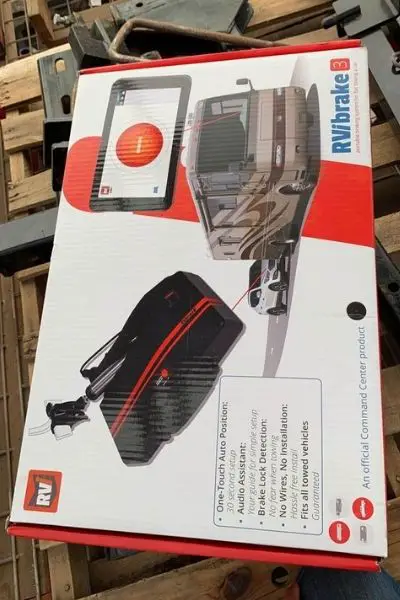
How Do Trailer Break Away Systems Work?
Trailer break-away systems use a tether line to connect a brake activation system to the tow vehicle’s hitch receiver. That tether is usually a small diameter wire rope that is strong enough to activate the breakaway system, but not strong enough to retain the trailer connection to the tow vehicle.
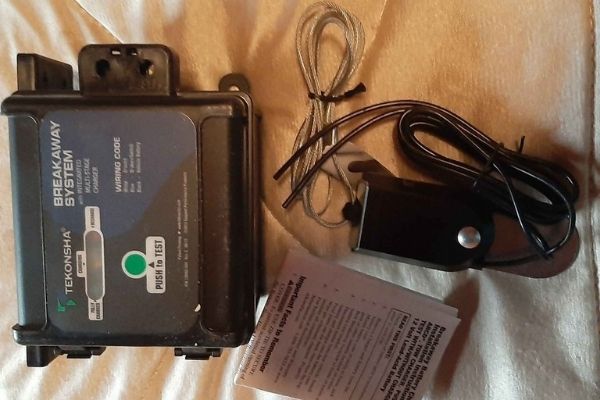
If the trailer detaches from the hitch or receiver, it will fall away from the tow vehicle. There is debate on the correct length the breakaway activation wire should be, many say it should be longer than the emergency chains so the breakaway brakes will activate only if the emergency chains fail. Others say it should be shorter.
The advantage to having the wire shorter than the emergency chains is that a trailer suspended only by the chains can sway violently, making the attached tow vehicle extremely hard to control. By activating the breakaway brakes, the trailer will drag on the back of the tow vehicle and minimize the amount of sway that occurs.
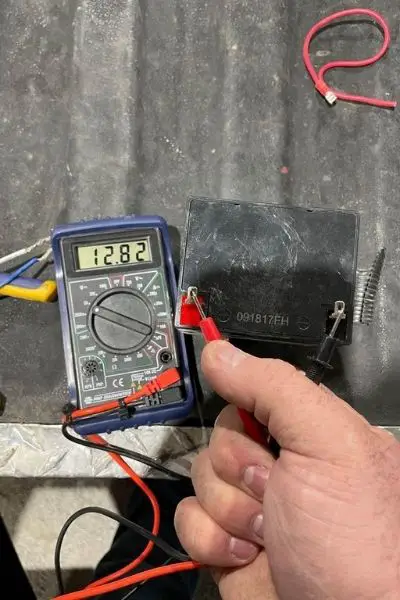
When the breakaway rope is pulled, it activates a switch or lever which in turn activates the brakes. This is an on/off activation, so the brakes come on at full power. Once activated, the brakes will remain activated until the battery dies (in an electrical system) or until you manually switch the breakaway switch back off.
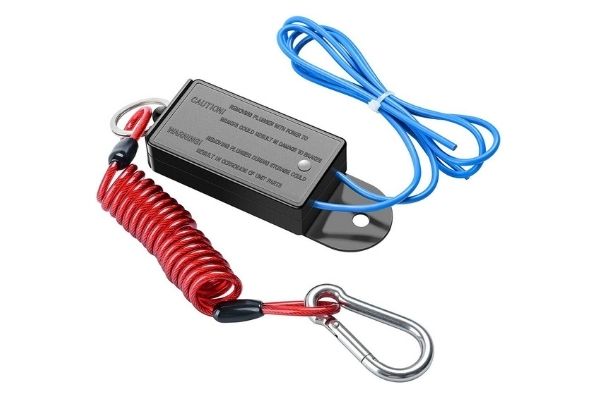
Do They Make Aftermarket Break Away Systems And Who Makes Them?
Aftermarket break-away brake controllers are available from a number of different manufacturers. These can typically be bought as a complete system, or the individual components can be bought as needed.
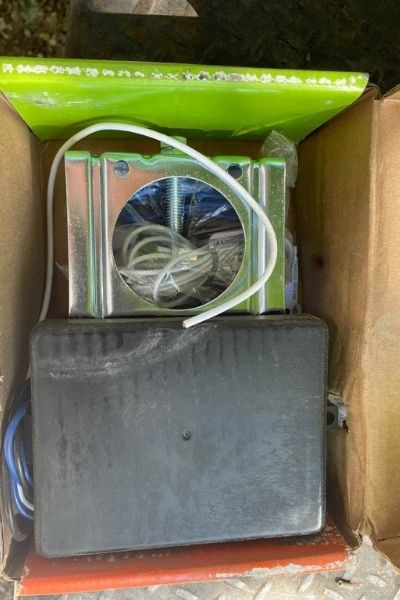
This allows you to tailor your break-away system to meet your specific needs. For example, if your trailer has a house battery, a separate break-away battery may not be necessary. In that case, you can buy just the controller switch and tie that into your existing battery and brake wiring.
Top manufacturers to look for include Curt, Tekonsha, Brightway, and Hopkins. Products from any of these brands will provide a safe and reliable break-away system that will last for years.
What Do You Look For In Aftermarket Break Away Systems?
Break-away brake systems are fairly standard between the main manufacturers’. When shopping for one you’ll want to look for a quality product with good reviews from a major retailer which can activate the number of axles on your trailer.
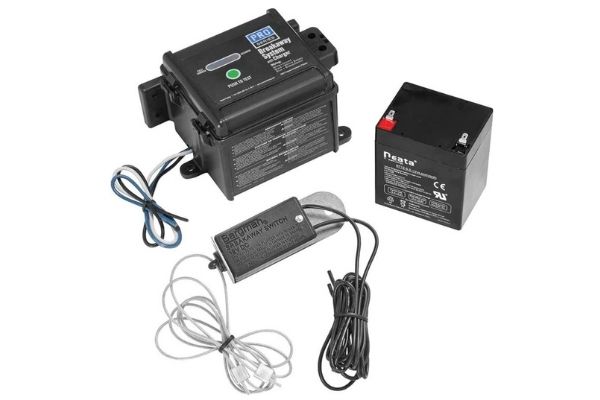
Depending on your budget, you can find models with some optional features like larger batteries, built-in chargers, and “push to test” buttons. These options can make your life easier, but they do not affect the overall performance or the primary function of the breakaway system they are on.
Are All Break Away Systems Electric?
Breakaway systems generally function the same way the trailer brakes function on any given trailer. For example, trailers with surge brakes usually have a hydraulic surge brake break-away system. Trailers with electric brakes generally have electrically activated break-away systems. This is because of compatibility issues in how the brakes actually function between the two different types of systems.
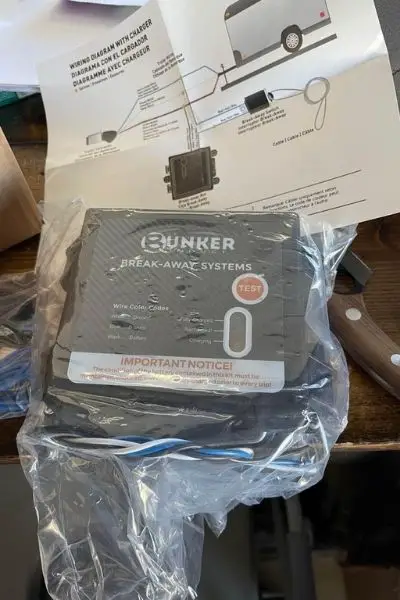
Is One Type Of Breakaway Braking System Better Than The Others?
All breakaway systems are designed to apply the brakes at maximum force in the event the trailer becomes separated from the tow vehicle. Because they are all designed to switch the brakes full-on, differences in the systems will be related to the brakes themselves and not the breakaway system.
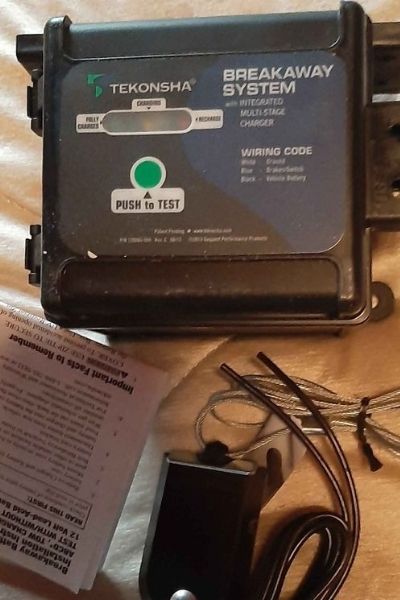
Disc brakes for example are considered to have better stopping power than drum brakes. Properly maintained and adjusted drum brakes will have better stopping power than poorly maintained or maladjusted brakes. These differences will be true regardless of the specific break-away braking system that is installed on your trailer.
How Does A Break Away Battery Charge?
There are several ways that your break-away battery can charge. Not all break-away systems will be able to charge with all of these methods, please refer to your specific system’s instruction manual for details.
- Charge from the tow vehicle. This can be the case for breakaway systems that have a built-in battery charger, or some that operate on the trailer house batteries.
- Plug in charge. The most common way to charge your breakaway battery will be from an extension cord, shore power, or generator. Simply run an extension cord from your power source to the battery charger and let it charge.
- External charging. Many break away systems have a removable battery which can be bench charged with a standard 12V battery charger or a battery maintainer. This is a good option if you are storing your trailer for an extended period of time.
- If your break away system runs from the house batteries, then the system will charge when you house batteries are charging. This can be from shore power, solar, a generator or however you keep your house batteries maintained.
- Solar battery maintainers. Some systems will allow you to connect a solar battery maintainer to your breakaway battery, allowing you to keep it charged with a small solar panel.
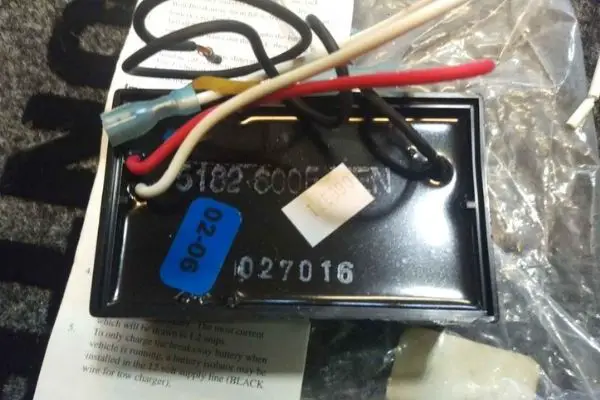
How Can You Test Your Break Aways System Is Working Properly?
To test your break-away system simply activate it and confirm that your brakes are locked up. The mechanics behind doing that will vary depending on your specific system. If you have surge brakes, for example, you typically flip a lever on the actuator (the lever that the breakaway wire is attached to).
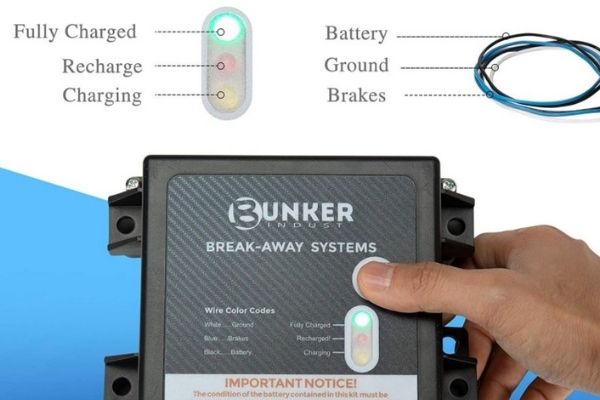
Once activated, your brakes should immediately pressurize. To deactivate, flip the lever back to the off position and the brakes should release. Some electrical brake systems work in a similar way, while others have a “push to test” button. Either way, they should always activate the brakes when on, and release them when you turn them back off.

